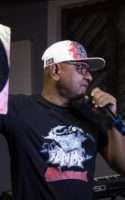From the bustling streets of Johannesburg to the vibrant townships of Cape Town, hip-hop has become a platform for the people, a voice that addresses social issues and empowers those who have been silenced for too long. Hip-hop in South Africa is more than just music; it’s a way of life, a culture that has permeated every aspect of society. In this article, we delve into the world of South African hip-hop, a cultural movement that has taken the nation by storm.
When it comes to the South African hip-hop scene, the name DJ Ready D is synonymous with excellence. The legendary DJ has been at the forefront of the industry for over three decades, paving the way for a new generation of artists and shaping the sound of hip-hop in South Africa. From his humble beginnings in the Cape Flats, Deon Daniels, known as DJ Ready D, credits music for saving his life. “If it wasn’t for hip-hop culture, I would have been in prison or in the grave,” he says.
DJ Ready D started his journey as a breakdancer, battling other crews in Cape Town’s CBD. But it was a chance encounter with a friend whose father owned a recording studio that changed everything. DJ Ready D convinced his friend’s dad to let him record in the studio, which became the foundation for the iconic hip-hop group Prophets of Da City. The group consisted of DJ Ready D, Shaheen, Ishmael, Ramone, and Mark Heuvel.
The group went on to be one of the most renowned hip-hop groups in the world, releasing three albums with their most critically acclaimed ‘Age of Truth’. “‘Age of Truth’ was a really angry album,” says Ready D. The album addressed a lot of the political issues in South Africa at the time. “South Africa was going through a state of emergency and in the US the hip-hop culture was becoming more of a black consciousness movement, it was easy and natural for us to gravitate towards that.” The album did also touch on gang violence which was the reality of South Africa.
Prophets of Da City were invited to perform at the inauguration of South Africa’s first democratically elected president, Nelson Mandela. Quincy Jones also invited the group to perform at the Montreux Jazz Festival in Switzerland. Despite performing at these big stages, for Ready D, the important thing is the impact they have on whoever they are playing for. “It has never been about the magnitude of the event but about the people; the faces stay with me,” he says.
His passion for youth development led him to establish a nonprofit organisation, Great Cape Ambassadors Project, G-CAP. The organisation targets youth and adults through their edutainment concept SR4A (Safer Roads for All), promoting road safety principles by educating through entertainment and music, using technology to capture hearts and minds.
DJ Ready D’s tenacity and persistence have helped him overcome adversity, such as when he lost his collectable vinyls in a fire. However, through collaboration and art exhibitions, he found a way to preserve the memory and value of the vinyls, using the proceeds to help fund G-CAP. “I’m grateful that my family and my neighbour who was also affected by the fire came out of that unscathed. After we lost all of the collectables we found a way through collaboration to see how we can preserve the memory and the value of the vinyls,” he says.
DJ Ready D’s story is one of resilience, passion, and finding a way to impact the world. He is a true ambassador of South African hip-hop, using his platform to empower the youth and drive positive change in his community.
See G-CAP here
Tell us: What impact do you think DJ Ready D and other pioneers of South African hip hop have had on the current state of the genre in the country, and what do you see as the future of South African hip hop?


